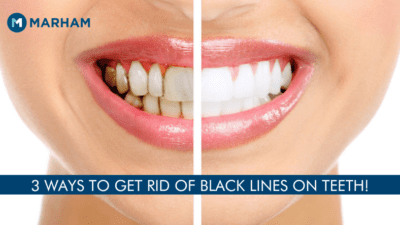Black lines on teeth are a cause of concern for many people. They may occur due to poor oral hygiene, smoking, drinking excess tea, or coffee, and some other reasons.
So, how do you remove black lines on teeth at home naturally? Check out everything you need to know about black lines on teeth that aren’t cavities and whether is there a way to remove them in this health blog.
Causes of Black Lines on Teeth:
According to research, the following are some direct sources of staining on teeth:
- consuming a dark food product on a regular basis, such as coffee
- using some drugs, such as liquid iron supplements
- using certain oral rinses and toothpaste
- smoking and tobacco use
- having silver sulfide crowns and fillings
Are Black Lines on Teeth Cavities?
“According to the reviewed articles published between 2001 and 2014, the prevalence of black stain varies from 2.4% to 18% with equal sex distribution,” says research.
Although black stains may appear to be cavities at first glance, they are not. They are also not typical food and beverage-related tooth discoloration.
These black streaks on teeth are simply a type of tartar, commonly known as dental calculus. Tartar is formed when oral plaque absorbs minerals from saliva and gets petrified.
The black lines are caused by the minerals absorbed by your tartar. While black stains on teeth are caused by an excess of iron and copper absorption.
What do Black Lines on Teeth look like?
The black lines may be solid or dashed, multiple unconnected black dots, or a thick line, depending on the situation. Here are some pictures of black lines on teeth:
So, Can you Remove Black Lines on Teeth at Home?
While there are many whitening solutions, such as brushing your teeth with baking soda, apple cider vinegar, or turmeric. They have not been scientifically proven to aid with teeth whitening because there is no evidence that it would work to give you whiter teeth.
Moreover, whitening toothpaste contains mild abrasives and chemicals that can aid in the removal of black stains from teeth. However, prolonged usage of teeth whitening products, on the other hand, would wear down the enamel layer and produce sensitive teeth.
Also, read Is Charcoal Toothpaste Good for your Teeth?
3 Proven Ways to Remove Black Lines on Teeth:
There are ways to remove black lines on teeth through professional procedures like teeth whitening. The method your dentist chooses will depend upon the type of black lines or stains you have.
The following dental procedures may improve black lines on teeth effectively:
1. Dental Exam and Cleaning to Remove Tartar
As discussed above, if this plaque build-up around gums is not eliminated by brushing and flossing, it will calcify and harden into tartar, also known as calculus.
In certain situations, such as when your body’s copper or iron levels are excessive, this tartar might look black. Only a dentist can remove tartar.
Through a dental exam clean, your dentist can remove your black tartar build-up and prescribe proper brushing and flossing procedures to avoid additional buildup.
2. Teeth Whitening or Porcelain Veeners
The type of food or drinks you ingest might cause a whole tooth to turn black or grey e.g tea or coffee in most cases. It might also be the result of an underlying dental problem.
While a chipped or fractured enamel on the tooth surface can cause discoloration in the tooth’s interior layers. To avoid future staining, the fundamental cause of tooth staining or discoloration must first be identified by a dentist.
After the cause is known they can apply procedures such as teeth whitening or porcelain veneers used to restore the original color of the teeth.
Read more about the Treatment of Cavities in Baby Teeth
3. If you have Black Lines on Dental Crowns
People who have dental crowns are more likely to have black lines on their teeth. Older crowns usually have porcelain covering bonded to a metallic foundation. Gum disease and gum recession can also be indicated by black lines under crowns.
In the case of a dental crown, a porcelain covering can wear away, revealing the metallic basis, which appears black or greyish blue near the gum line. It can be treated by replacing the older crown with a newer one.
Newly introduced dental crowns do not have a metallic basis, the crown cannot cause a black line to develop. However, if the underlying tooth is dark or decayed, a black line may still emerge.
On the other hand, if the black line is due to gum disease like if the original tooth under the crown has rotted, your dentist will treat it to keep the crown stable and to evaluate other possibilities.
Consult a Dentist Online!
While there are numerous home remedies to remove black lines at home like baking soda, ACV, etc there is no strong scientific evidence to support their claim.
Consulting a dentist should be your top priority after noticing any changes in the color of your teeth or experiencing any pain. Only they can guide you regarding the proper treatment for dental issues.
Can’t Find the App?
| Android | IOS |
|---|---|
  |
  |
FAQs
Why are my teeth getting black lines?
The black lines or streaks on teeth are typically a type of tartar, commonly known as dental calculus. Tartar is hard to remove and brushing or other home remedies might not be able to eliminate this accumulation.
Are black stains on teeth permanent?
Yes, some dental stains cannot be eliminated with bleaching meaning they are permanent. However, there is a treatment for this as well. Dentists use porcelain veneers or crowns to conceal the discoloration.
How do you know if your teeth are rotting?
Some common signs of rotting teeth are toothache, the discomfort that keeps you awake, soreness or pain when eating or drinking anything hot, cold, or sweet. Bad odor and tooth discoloration are also some signs.

